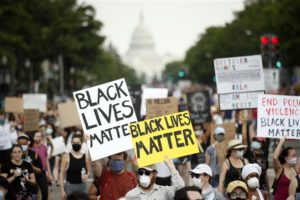June 14, 2020
“Find out just what any people will quietly submit to and you have the exact measure of the injustice and wrong which will be imposed on them.” —
Frederick Douglass

(Photo Courtesy of NBC News)
George Perry Floyd, Jr. Prior to May 25, 2020, a man known mostly to his family, his friends, and his local community. But in the last several days his name has become synonymous with a movement that is forcing America to reexamine the history of slavery, racism, and injustice that still permeates American life.
The manner in which George Floyd died was, unfortunately, not uncommon. He was not the first to die at the hands of a white man who tried to deny his humanity and the reality is that he is likely not the last. Had his murder not been captured on video, his story may well have gone untold.
Is it possible that moments before he was approached by the police officer who killed him, Mr. Floyd had any idea that his time on earth was coming to an end? Did he have any idea how his death would affect mankind?
American history is replete with accounts of how African Americans have faced adversity, endured, and overcome. Slavery. Jim Crow prejudice. Segregation. The Civil Rights Movement. As the fight for injustice is taken up by a new generation, revisiting America’s history can and does provide guidance. Until we have an honest conversation about why all lives are not valued the same, we will, as a society, continue to be covered with the stain of racial relations that began with the arrival of African Americans in this country in 1619.
We can remove statues, rename schools, and shelve celebrations that honor fallen soldiers who fought for the losing side in the battle to end slavery. But we cannot erase history. We must be willing to acknowledge why the presence of a black man instills fear in some, hatred in others, and a misguided notion that he is not included in the declaration of our founding document that “all men are created equal, that they are endowed by their Creator with certain unalienable rights, that among these are life, liberty, and the pursuit of happiness.”
George Floyd had a right to expect the same rights as every other American citizen. We have an obligation to live out the ideals of a just society. That begins with letting go of stereotypes, embracing the diversity that exists among us, holding those accountable who jettison America’s founding principles, and accepting that our country is strong enough for all of us to coexist peacefully. “If there is no struggle, there is no progress,” stated in the 19th century by Frederick Douglass.
Frederick Douglass Memorial and Historical Association, Inc. supports our fellow men and women in continuing to agitate for an end to racism and injustice.